Advertisement
A Horse Race Without A Horse: How Modern Trail Ultramarathoning Was Invented
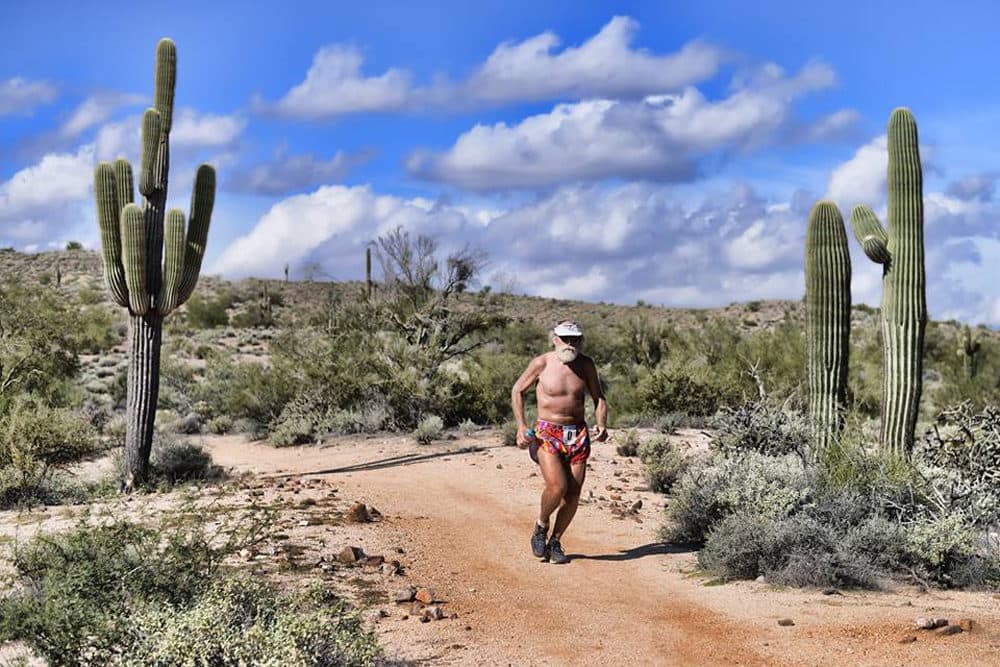
This story was re-broadcast on our 8/8/20 episode.
Stop me if you’ve heard this one before: the modern-day sport of trail ultramarathoning began 45 years ago when a man showed up to a 100-mile horse race — without a horse.
An ultramarathon is defined as anything longer than 26.2 miles. And it’s true — tens of thousands of people every year run 50, 100 and even 1,000 miles over rough terrain because of that man and his nonexistent horse.
But the story of ultramarathoning actually begins with another man — named Wendell Robie — and another horse.
The Western States 100
"Wendell's a little guy," says Gordon Ainsleigh, who most people call Gordy. "He's strong, he's wiry and he wears cowboy boots. Well, he doesn't anymore. He died in ’84."
Gordy was a friend of Wendell’s back in the day.
In 1954, Wendell was camping with the Sacramento Horsemen’s Association at Robinson Flat, 30 miles west of Lake Tahoe. Gordy recalls sitting around the campfire on the last night of the trip.
"Wendell was bragging about what a great horse he had," Gordy says. "And one of the guys said, ‘Ah, you can't compare that to the great horses of the last century.’ And Wendell says, ‘Well, what could they do that my horse can't?’ And the guy said, ‘Well, they could go a hundred miles over mountains and desert.’ And so Wendell said, ‘Well, what about mountains and canyons?’ And so, he got a few of his friends together. And they rode from Tahoe to Auburn."
"Wendell only planned to do it once," Gordy adds. "But then so many people said, ‘God, if I thought you had any chance at all, I would have come with you.’ "
Advertisement
That’s how the Western States 100 trail ride — now know as the Tevis Cup — began.
And this is where I should probably mention that Gordy Ainsleigh isn’t just an old friend of Wendell Robie’s. He’s now better known as the father of ultramarathoning.
For Gordy, much as for Wendell, the Western States started with a horse.
"When I was a kid, I actually subscribed to Lone Ranger comic books," Gordy says.
Gordy dreamed of owning a horse of his own. And years later, while attending college at University of California, Santa Barbara, he finally bought a horse named Rebel.
"And the lady said someone had told her that it would make a good endurance horse," Gordy says. "I said, ‘What's that?’ "
A good endurance horse is what was needed to finish the Western States 100. By this point, 1971, Wendell Robie's trail ride was well-established as one of many endurance horse races around the world.
Rebel turned out to be a very good endurance horse — but Gordy was not an ideal rider.
"I weighed 200 pounds," Gordy says. "Well, I weighed more than that. I weighed 205."
Gordy says most riders walk their horses on the downhills. (Running or trotting them with weight on their backs puts too much pressure on their front legs.) Instead, Gordy hopped off Rebel’s back and ran down the hills.
"And, you know, I'd be passing all these people who are walking their horses," Gordy says.
Gordy’s very clear on this: he says he’s never been a great runner. He never had a lot of talent. But from the time he was very young, he’d learned to find solace in running.
Out Of Place
"I just felt really out of place," Gordy says. "We were Seventh-day Adventists. We went to church on the wrong day. We — my mom and grandma who raised me — I didn't have a dad. And, you know, that made me feel really, like, undeserving. I don't know. I wanted to belong so much.
"I remember this one day — I think it was second grade. I came out on the playground with a bag lunch. Grandma had packed the lunch, and I just couldn't see anybody I could go up to and say, ‘You want to have lunch?’ I panicked. And I just felt like I couldn't breathe. And I just dropped my lunch, and I ran home for lunch."
“I just felt really out of place. ... I wanted to belong so much.”
Gordon Ainsleigh
Gordy says that was his first run. Soon, he was running to school whenever he missed the bus so that he didn’t have to bother his mother for a ride. And then, in junior high, he had a teacher who treated gym class like military PT drills — lots of push-ups. Gordy hated doing push-ups.
"You know, I'd goof off, and he'd make me run," Gordy says. "And I made sure I wore a real pained expression whenever he could see me. And I was having a good time."
And that brings us back to the early 1970s when Gordy, running almost as often as he was riding, and Rebel finished two Western States trail rides together.
"He didn't really like me that much, but we had a lot of fun together," Gordy says.
Running
But after that second ride, in the summer of 1972, Gordy met a woman.
"And she wanted to get married and have kids," Gordy says. "And she also wanted me to give her my horse. And I figured, ‘Well, you know, we're going to spend our lives together.’ So I gave her my horse."
And then, Gordy says, the woman dumped him. But she kept his horse.
Gordy bought another horse for the 1973 Western States, but that horse went lame. That’s when Gordy had a conversation with the secretary of the Western States Trail Foundation. Her name was Drucilla Barner.
"Drucilla came up to me — and she always spoke for Wendell, I mean, they were just like one voice — and she invited me to run the next year, which was ’74," Gordy says.
Run — as in, without a horse.
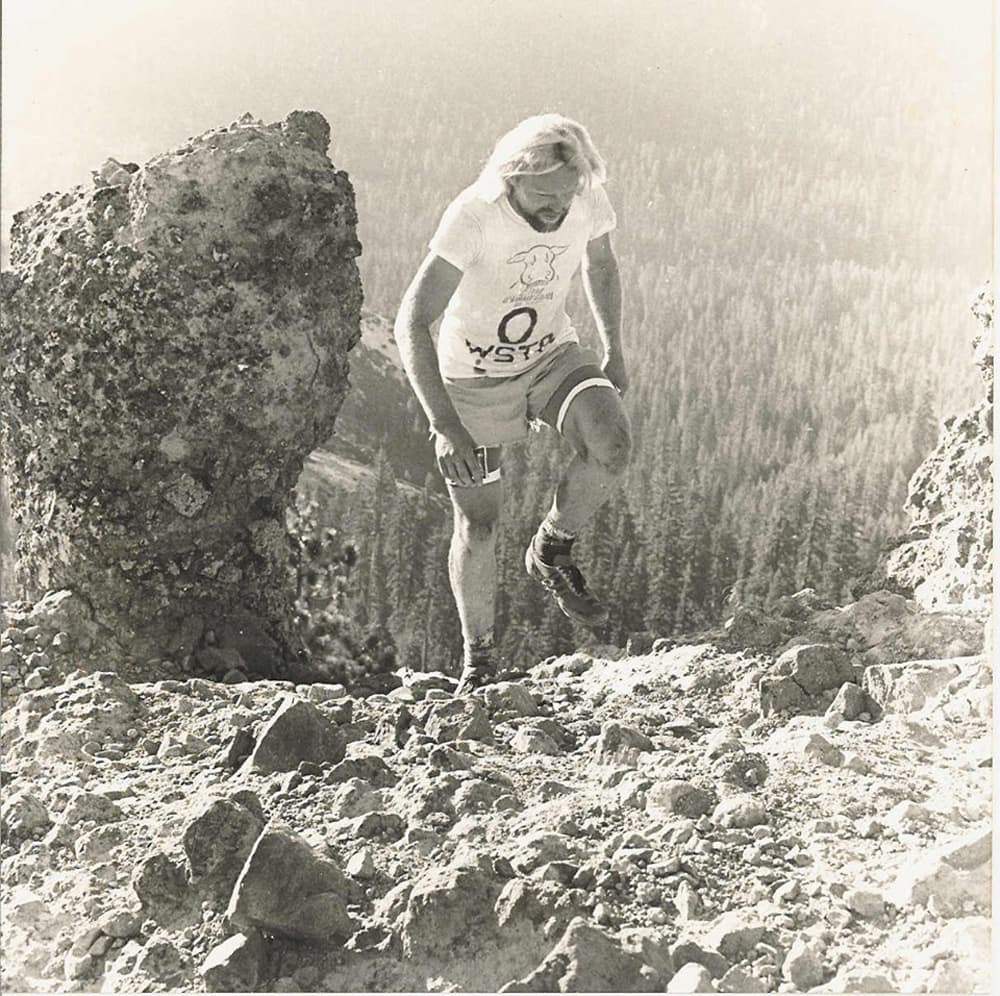
It was an interesting idea. But at first, Gordy brushed it off.
"You know, I've always been a terrible procrastinator," Gordy says. "It's historic. And so I expected, ‘Oh, I'll just get another good horse by that time.’ Well, I didn't."
"So training to run 100 miles over harsh terrain felt easier to you than getting a new horse?" I ask.
"Well, I hadn't gotten a new horse," Gordy says. "The whole thing with the evolvement of this incredible sport we have, it's such a verification of a Hindu saying that the most beautiful lotus flower will always be the one that grows out of a dung heap."
(Actually, I think it’s a Buddhist saying. But you get the idea.)
Gordy turned 27 years old that summer. He’d dropped out of college. He says he was aimless and depressed. And lacking anything better to do, he found himself visiting his old high school, where he started training for long distance road races with the school’s math and music teacher.
"You know, I've always been a terrible procrastinator. It's historic.”
Gordon Ainsleigh
That prepared him to run long distances. But he prepared for the grueling uphills and downhills of the trail by participating in a brand-new sport called Ride and Tie. (It doesn’t really matter how it works — all you need to know is that it’s a relay race involving teams of two runners and a horse.)
Race Day
By the time the 1974 Western States came around, Gordy was in pretty good shape. He also had a new girlfriend.
"I told my girlfriend, ‘Well, I'm leaving at such and such a time. Can you go up with me?’ " Gordy remembers. "And she says, ‘Oh, no, I'm going to the jalopy races with Margaret Friday night.’ And I go, ‘What?’ You know, I felt really left alone and abandoned. Somehow, I knew I'm about to do the most important thing I've ever done in my life. And she's not going with me.
"Now, how did I know it was? But, of course it was."
Gordy drove to camp on his motorbike and met up with a good friend — he calls her his sister. Her name is Diane.
"Diane asked me, ‘Where are you going to sleep?’ " Gordy recalls. "I said, ‘I don't know. She says, ‘Well, why don't you sleep in our horse trailer?’ So, you know, we scooped out the manure — I mean, horse poop actually doesn't smell that bad."
Gordy says the riders woke up early the next morning — at 3 or 3:30 a.m. They had to feed and water their horses and get everything set for the 5 a.m. start. Gordy stayed in bed for a while.
"And then finally, I got up and got ready to go," Gordy says. "I had a lot of time because it doesn't take me as long to get ready for a run as a horse.
"About 10 minutes before the start, I went up to Ralph and Betty Deaver. They were sitting around with a gas lantern — one of those old kind that goes, ‘Chhhhhhh.’ And I said, ‘Well, I guess I'll be going.’ And they said, ‘Well, good luck, Gordy.’ And I just disappeared into the darkness.
"It was like nobody knew it was happening. One of my favorite words is auspicious — this is very inauspicious. It was amazing."
One More Step
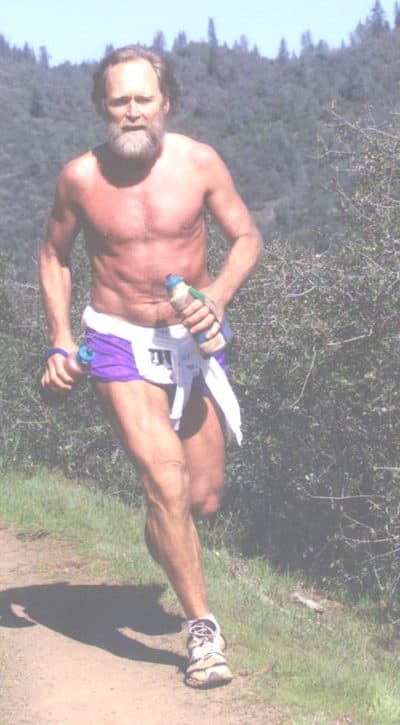
Soon, the horses and their riders caught up to Gordy.
"When we hit the single-track trail, I had to go at their speed," Gordy says. "You know, that was eight miles an hour, and that was way faster than I wanted to run — well, for a hundred miles, you know.
"I got to the 40-mile point, and I just said, ‘I'm never gonna make this.’ It was 107 [degrees]. It was so hot, I couldn't even focus. So I got to the point where I said, ‘Well, what can I do?’ And this voice from inside me said, ‘I can still take one more step.’ "
Gordy told himself that as long as he could still take one more step, he would.
But on the climb to Devil's Thumb, where the trail rises 1,600 feet in 1.6 miles, Gordy decided to quit.
When he arrived at the top, he found his good friend, Di ane.
"So she came up to me, and she goes, ‘Gordy, how you feeling?’ And I go, ‘I'm quitting,’ " Gordy says. "She goes, ‘Don't quit just yet. Come on over here under this tree and talk with Paige and me.’ So I did. And she correctly diagnosed what was wrong with me. I had run out of salt — see, because there weren't any aid stations."
That’s right. Gordy Ainsleigh had set out to run 100 miles in a race without a single water stop. The Thursday before the race, he had bought 10 bottles of Gatorade and, using his motorbike, had stashed them along the course.
"And I thought that’d be plenty," Gordy explains. "I mean, 10 quarts. I mean, how much could you need? Well, I found that you need a lot more than that."
Diane massaged Gordy’s legs and gave him salt tablets and water.
"And I couldn't believe it," Gordy says. "It's like a half hour later, I just felt fine."
Greater Aspirations
So, Gordy kept running. He ran all the way to the finish line in Auburn. By then, he’d decided to stop worrying about the girlfriend who’d left him feeling abandoned when she’d gone to the jalopy races instead of traveling with him to the start. Instead, he was trying to impress a rider who’d accompanied him to the finish.
"I did a dive forward roll over the finish line," Gordy says. "And they wrote it up in the paper that I'd done a handspring. No, I can't — I never was good at handsprings, but I could do a dive forward roll."
(For the record, Gordy and that rider soon started dating.)
Gordy didn’t run the Western States the next year in 1975. But a man named Ron Kelley did. He dropped out just two miles from the finish.
"It was, like, tragic," Gordy says. "Well, it was more tragic for him than the rest of us."
Tragic because, by this time, Gordy had realized that his aspirations were greater than just being known as the guy who showed up to a 100-mile horse race and decided to run instead.
"You know, if we're going to make this into a sport, we have to have more than me finish it," Gordy says. "Because at this point, I just look like a freak of nature that's a superhuman athlete. I knew I wasn't."
A year later, in 1976, a runner named Ken Shirk decided to give the Western States 100 a try. Everyone calls him "Cowman."
"And I decided, ‘OK, I want to make sure this one finishes,’ " Gordy says.
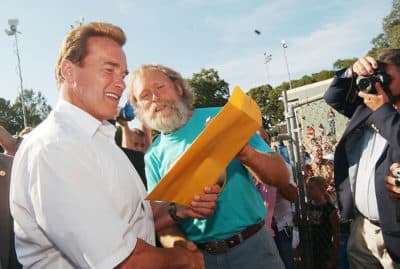
Gordy wasn’t running again that year. He was working the "Last Chance" aid station — 43 miles from the start. When Cowman arrived at Last Chance, he was on pace to cross the line under the 24-hour limit. All he had to do was keep moving. Instead, he stopped to talk to Gordy.
"Cowman loves to talk," Gordy says. "He just loves to talk."
(For the sake of accuracy, I have to point out that Cowman’s not the only one who loves to talk — at this point in our conversation, Gordy and I had been talking for 34 minutes. I’d asked just three questions.)
"We were just chatting, mostly him chatting, you know," Gordy says. "Finally, about a half hour later, I said, ‘Cowman, you can't sit here and talk to me and make it to Auburn in 24 hours. Get out of here.’ So he left. And that 30 minutes — he was 30 minutes late. He would have made the 24 hours if he hadn't sat there and talked to me for a half hour.
"He was close enough that Wendell came up after the awards ceremony and said, ‘Gordy, let's make this a yearly event.’ And I go, ‘With advertising and the whole bit?’ He goes, ‘With advertising and the whole bit.’ So I put this ad into Runner's World in the classifieds. It said, ‘The ultimate challenge: 100 miles of cross-country running through the high mountains and deep canyons of Northern California's Sierra Nevada Mountains.’ "
That was 1977. Fourteen runners started that race. One finished in under 24 hours. Two more in under 30.
In 1978, 63 people participated. Thirty finished, including Gordy, who attempted the race for the second time.
"After that I was talking to Drucilla, Wendell's secretary," Gordy says. "And I said, ‘Do you think the run will ever be as big as the ride?’ And she said, ‘Oh, much bigger.’ Her and Wendell saw where it was going to go. I didn't see where it was going to go. I wanted to start an event. And I realized in ’78 that I'd succeeded."
Gordy's Purpose
The Western States is widely recognized as the world’s oldest trail ultramarathon. In 1978, Gordy also helped establish the first 50-mile trail race. And soon after that, he stepped back from organizing races altogether.
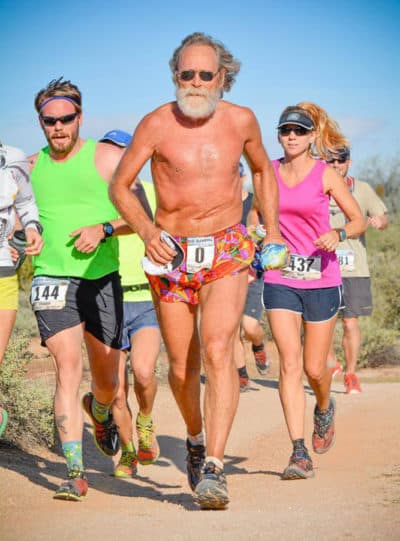
"I've never been a manager, you know," Gordy says. "I'm a Gemini. You know, it's like, I invent things. And so I went off to chiropractic college."
And this sport Gordie Ainsleigh “invented?” – the trail ultramarathon? It’s grown. A lot. In 2018, there were more than 115-thousand ultramarathon finishers in more than 2000 races…in North America alone.
Not bad for the boy who started running because he was so desperate to find a place where he belonged.
"My grandma used to say — I had a lot of close calls when I was a kid — and she said, ‘Gordy, the Lord is preserving you for a purpose,’ " Gordy says. "I kind of think she was right."
This segment aired on June 29, 2019.
